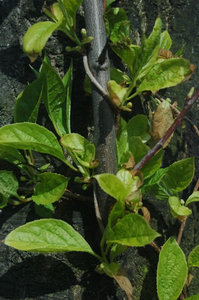
Pinyin: Wu Wei Zi Latin: Schisandra Chinensis
Common Name
Wu wei zi, schizandra, five flavor berry, fructus schisandra, gomishi, omicha, ngu mie gee, magnolia vine
Family
Traditional Chinese Medicinal (TCM) Uses*
Derived from the fruit of the plant. This herb is used in traditional Chinese medicine for cough, wheezing, diarrhea and spontaneous sweating.*
Schisandra is also used as an adaptogen. Various lignans are believed responsible for the activity of schisandra, but limited research evaluates its mechanism of action. In animal models, schisandra protects the liver against various toxins (e.g. menadione), prolongs pentobarbital sleep time, and increases cardiac contractility without affecting blood pressure. In vitro studies have shown that schisandra has protective effects against adriamycin-induced cardiotoxicity. No human trials have been performed with this supplement. Although no drug interactions are reported, schisandra may induce cytochrome P450 and affect other metabolic pathways. No common adverse events are reported. Additional research is necessary to understand the efficacy and to uncover possible interactions associated with this supplement. Purported uses: Asthma, Cough, Diarrhea, Indigestion, Influenza, Liver disease, Premenstrual syndrome, Strength and stamina, Sweating.*
References
Sources: Schisandra Chinensis Wu Wei Zi Sloan Kettering Cancer Center
Natural dietary supplements are designed to offer the body support to promote health, harmony, balance and overall well being.*

 Get Well Natural, LLC
Get Well Natural, LLC  Kidney Function & Regeneration Health
Kidney Function & Regeneration Health  Platelet & Blood Cell Health
Platelet & Blood Cell Health  Prostate, Flow & Function Health
Prostate, Flow & Function Health  General Mind & Body Health
General Mind & Body Health  Heart, Cholesterol & Cardio Health
Heart, Cholesterol & Cardio Health  Allergy-Free Body
Allergy-Free Body  Anxiety & Stress
Anxiety & Stress  Blood Platelet Counts & Function
Blood Platelet Counts & Function  Blood Pressure Health
Blood Pressure Health  Kidney Health
Kidney Health  Immune System Health & Balance
Immune System Health & Balance  Prostate & Urinary Health Function
Prostate & Urinary Health Function  Blood Sugar Balance
Blood Sugar Balance  Cardiovascular Heart Health
Cardiovascular Heart Health  Detoxification & Healthy Cells
Detoxification & Healthy Cells  Women's Health
Women's Health  Liver Regeneration
Liver Regeneration  Pain-Free Body
Pain-Free Body  Water & Air Filtration
Water & Air Filtration 


